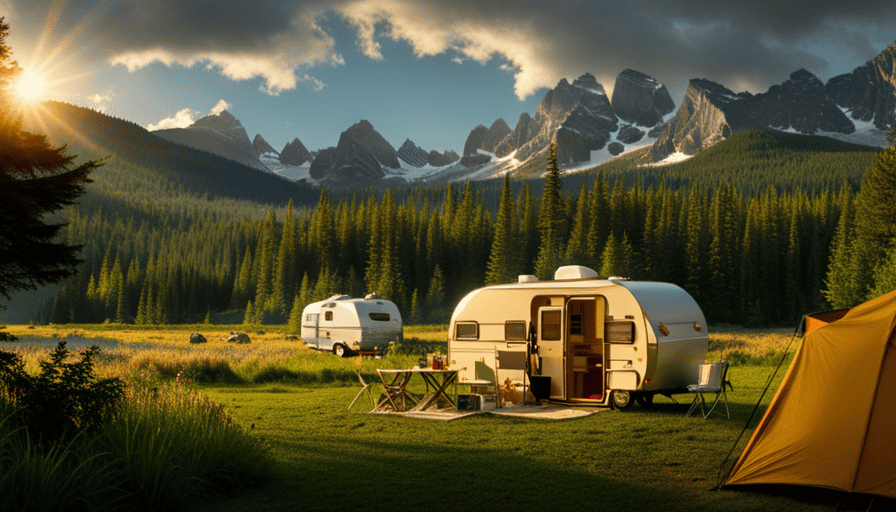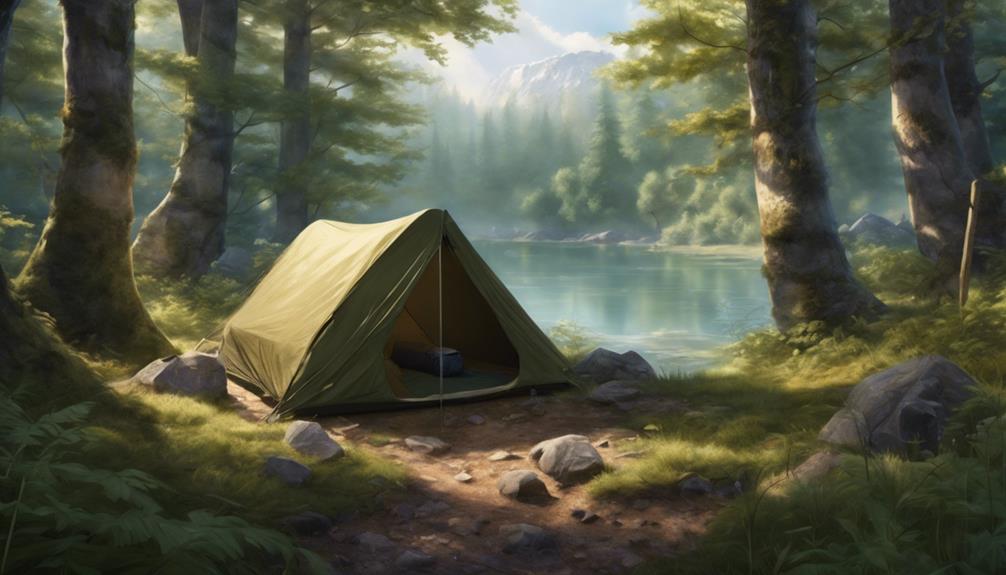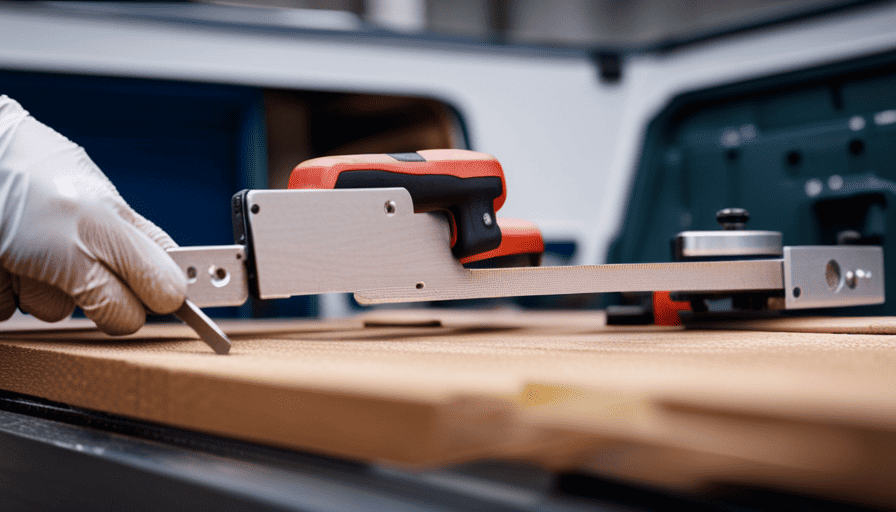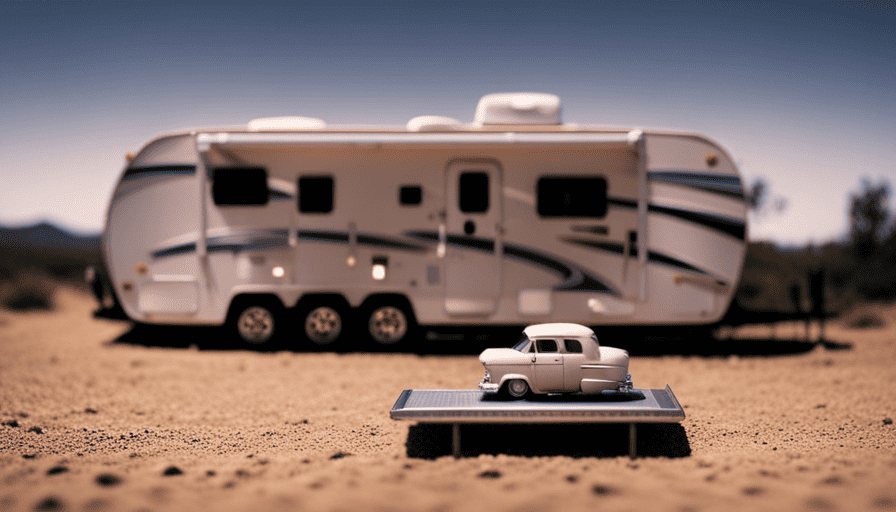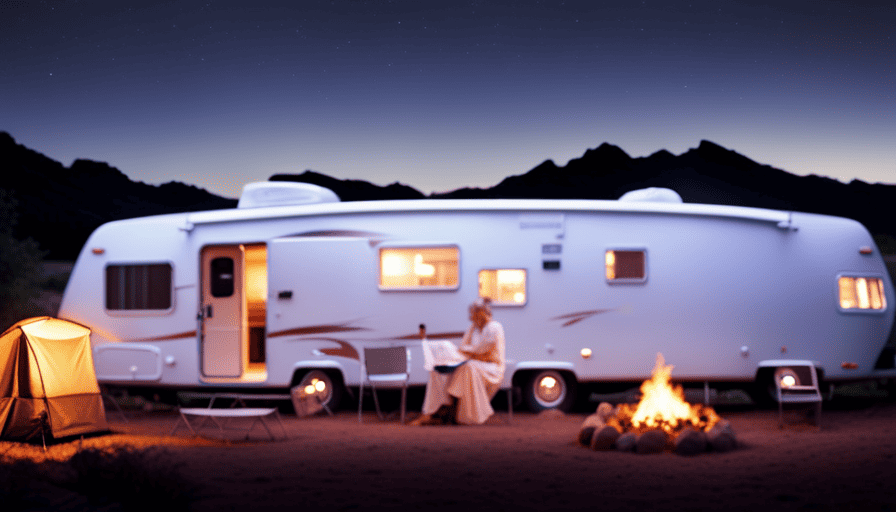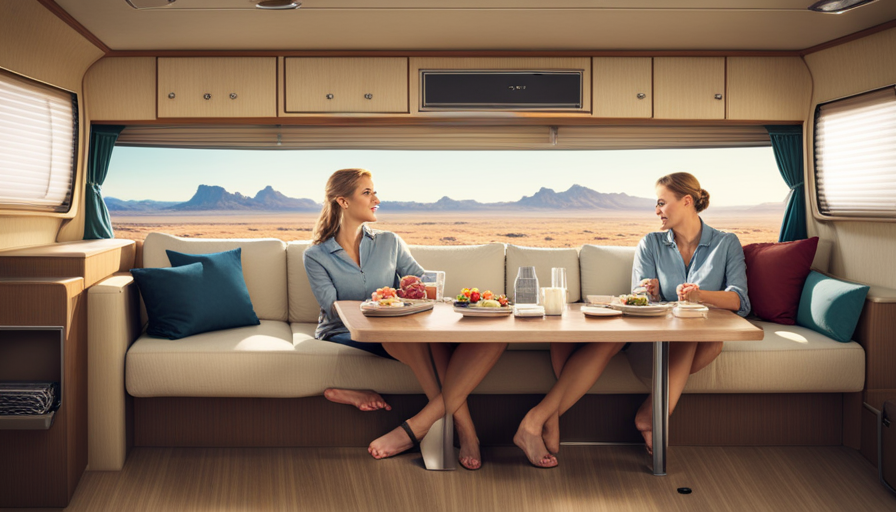The saying ‘Home is where you park it’ holds true, especially for avid adventurers like me, who view a camper as the ideal portable home. Nonetheless, before embarking on this nomadic lifestyle, it is important to understand the financial impact of this dream.
In this article, I will delve into the intricacies of camper pricing, exploring the factors that affect it and the different types of campers available. We’ll also discuss the pros and cons of buying new versus used, and how to set a realistic budget.
Additionally, I’ll guide you through the various places to buy a camper and the additional costs to consider. For those in need of financial assistance, I’ll touch upon financing options. And for the DIY enthusiasts out there, we’ll even explore the world of camper conversions and DIY campers.
So, if you’re ready to hit the road and find your perfect camper, let’s dive in and discover how much it really costs.
Key Takeaways
- Understanding the factors that affect camper pricing, such as customization and rental options, is important when considering the cost of owning a camper.
- There are different types of campers to choose from, including DIY camper vans and camper rentals, each with its own pros and cons.
- When deciding between buying new or used campers, it’s worth considering that used campers are generally more affordable and have already experienced depreciation.
- Setting a budget and researching price ranges for different types of campers is crucial in order to find a camper that fits within your budget.
Factors that Affect Camper Pricing
So, you’re probably wondering how much you’re going to shell out for that dream camper of yours, huh? Well, the price of a camper can vary depending on several factors.
One important factor to consider is the level of customization you want for your camper. If you’re looking for a camper with all the bells and whistles, like built-in kitchens, bathrooms, and luxurious amenities, you can expect to pay a higher price. On the other hand, if you’re willing to go with a more basic model and add your own personal touches later, you can save some money.
Another factor that affects camper pricing is the option to rent instead of buying. Renting a camper can be a more affordable option, especially if you only plan on using it for a short period of time. There are many camper rental options available, from small pop-up campers to large motorhomes. Renting allows you to experience the camper lifestyle without the long-term commitment and financial investment.
Now that you have an idea of how camper customization and rental options can affect pricing, let’s dive into the different types of campers.
Different Types of Campers
There are various types of campers available, each offering a unique experience for outdoor enthusiasts. One popular option is the DIY camper van. This type of camper allows you to convert a regular van into a cozy living space on wheels. With a DIY camper van, you have the freedom to customize it to fit your specific needs and preferences. It can be a fun and rewarding project for those who enjoy hands-on work.
Another option to consider is camper rental. This is a great choice if you don’t want to invest in buying a camper or if you only plan on using it for occasional trips. Many companies offer camper rental options, ranging from compact trailers to luxurious motorhomes. Renting a camper allows you to experience the joys of camping without the commitment of ownership.
Now, let’s transition into the next section about new vs. used campers. When deciding between the two, there are several factors to consider, such as budget, maintenance costs, and personal preferences. Both new and used campers have their advantages and disadvantages. By weighing these factors, you can make an informed decision that suits your needs and allows you to enjoy the great outdoors to the fullest.
New vs. Used Campers
When it comes to choosing between new and used campers, it’s like deciding whether to embark on an adventure with a blank canvas or a well-loved masterpiece.
There are several factors to consider when buying a camper, and understanding the pros and cons of buying a used camper can help you make an informed decision.
-
Cost: One of the biggest advantages of buying a used camper is the price. Used campers are generally more affordable compared to new ones. This allows you to get more features and amenities for your budget.
-
Depreciation: New campers can lose a significant amount of their value as soon as you drive them off the lot. With a used camper, the depreciation has already occurred, which means you won’t experience the same level of value loss.
-
Maintenance: Used campers may require more maintenance and repairs compared to new ones. However, if you do your research and choose a well-maintained used camper, you can minimize the risk of unexpected issues.
-
Customization: New campers offer the opportunity to customize the interior and exterior according to your preferences. With a used camper, you may need to compromise on certain features or settle for someone else’s design choices.
Considering these factors, it’s important to assess your budget before setting out to find the perfect camper. By understanding the pros and cons of buying a used camper, you can make an informed decision and set a budget that aligns with your needs and preferences.
Setting a Budget
When setting a budget for purchasing a camper, it’s important to determine your financing options. This includes considering whether you’ll be paying for the camper in cash or if you’ll need to finance it through a loan.
Additionally, it’s crucial to consider the additional costs associated with owning a camper, such as insurance, maintenance, and storage fees.
To ensure that you’re getting a fair price, it’s essential to thoroughly research price ranges for the type of camper you’re interested in.
Determine Your Financing Options
If you’re looking to buy a camper, you’ll want to explore your financing options to make your dream adventure a reality.
The first step in determining affordability is to evaluate your personal finances. Take a look at your income, expenses, and savings to see how much you can comfortably allocate towards monthly payments. Once you have a clear understanding of your budget, it’s time to start exploring loan options.
Many banks and credit unions offer loans specifically for recreational vehicles, with competitive interest rates and flexible repayment terms. Additionally, some dealerships may offer in-house financing options. It’s important to compare different lenders and loan terms to find the best fit for your needs. Keep in mind that interest rates and loan amounts will vary depending on your credit score and financial history.
Now that you have a better idea of financing options, let’s consider additional costs such as insurance and maintenance.
Consider Additional Costs
Don’t forget to factor in the expenses of insurance and maintenance, as they can add up and potentially impact your overall budget. When considering the cost of a camper, it’s important to take into account the additional expenses that may arise.
Here are three items to consider:
-
Insurance: Camper insurance can vary depending on factors such as the type of camper, your location, and your driving record. Make sure to research different insurance providers and compare quotes to find the best coverage at the most affordable price.
-
Maintenance: Regular maintenance is necessary to keep your camper in good condition and ensure its longevity. This includes things like oil changes, tire rotations, and general repairs. It’s important to budget for these ongoing costs to avoid any unexpected surprises down the road.
-
Hidden Fees: When purchasing a camper, there may be hidden fees such as delivery charges, registration fees, and taxes. These costs can quickly add up, so it’s important to factor them into your overall budget.
Considering these additional expenses and hidden fees will give you a more accurate understanding of the total cost of owning a camper.
In the next section, we’ll discuss how to research price ranges to find a camper that fits your budget.
Research Price Ranges
To ensure you find a camper within your budget, it’s essential to research and compare price ranges before making a purchase. Factors affecting demand and pricing strategies can greatly impact the cost of campers. By understanding these factors, you can better navigate the market and find the best deals. To provide you with a comprehensive overview, I have prepared a table below that outlines different types of campers and their average price ranges:
| Camper Type | Price Range (USD) |
|---|---|
| Pop-up | $5,000 – $15,000 |
| Travel Trailer | $10,000 – $35,000 |
| Fifth Wheel | $30,000 – $100,000 |
| Motorhome | $50,000 – $200,000 |
As you can see, the price range varies depending on the type of camper you are interested in. Considering these price ranges and the features you desire will help you make an informed decision. In the next section, we will explore where to buy a camper and continue our journey towards finding your perfect camper.
Where to Buy a Camper
One interesting statistic to consider when looking for a camper is that the majority of campers are purchased from dealerships rather than private sellers. There are several reasons why this is the case.
Firstly, dealerships offer a wide selection of campers, ranging from brand new models to used ones. This gives buyers the opportunity to choose the camper that best suits their needs and budget.
Secondly, dealerships often have knowledgeable staff who can provide valuable information and guidance on the different camper models available. They can answer any questions that potential buyers may have and help them make an informed decision.
Lastly, dealerships often offer financing options, making it easier for buyers to afford their dream camper. This is especially beneficial for those who may not have the full amount to purchase a camper upfront.
When it comes to finding the best places to buy a camper, there are a few options to consider. Firstly, visiting local camper dealerships is a great way to see and test out the campers in person. Additionally, there are many online options available, such as websites that specialize in camper sales and classified ads on platforms like Craigslist or Facebook Marketplace. These online options provide convenience and the ability to compare prices and features from the comfort of your own home.
Transition: Now that we know where to buy a camper, let’s move on to the next step: negotiating the price.
Negotiating the Price
When negotiating the price of a camper, there are a few key points to keep in mind.
First, it’s important to research comparable listings to get an idea of the market value and ensure you’re getting a fair deal.
Second, be prepared to walk away if the seller isn’t willing to negotiate or meet your desired price.
Finally, consider trade-ins or financing deals as potential bargaining tools to help lower the overall cost.
By following these strategies, you can increase your chances of getting a great deal on a camper.
Research Comparable Listings
If you’re looking for a camper, you’ll want to check out similar listings to get an idea of the average price range. Researching comparable listings can help you understand the factors affecting the value of a camper and provide you with valuable tips for negotiation. By comparing prices, you can determine if a seller’s asking price is fair or if there is room for negotiation. To make it easier for you, here is a table that shows some examples of comparable listings and their prices:
| Listing | Price |
|---|---|
| Listing 1 | $10,000 |
| Listing 2 | $12,500 |
| Listing 3 | $11,000 |
| Listing 4 | $9,500 |
By studying these listings, you can gain insights into the average price range and use this knowledge to your advantage during negotiations. Remember, being prepared to walk away can give you leverage in the bargaining process. Transitioning into the next section, it’s important to be aware of this strategy to ensure you get the best deal possible.
Be Prepared to Walk Away
Remember, if you’re not fully satisfied with the deal, don’t hesitate to walk away and find a better opportunity that truly meets your needs and desires. Having a walk away strategy is crucial when negotiating for a camper.
It shows that you aren’t desperate and are willing to explore other options. When negotiating, it’s important to have a clear understanding of your budget and the value of the camper you’re interested in. This will help you avoid overpaying.
Don’t be afraid to use negotiation tactics such as asking for a lower price, requesting additional features, or even mentioning other listings you’ve seen. Remember, the power lies in your ability to walk away if the terms aren’t favorable.
By doing so, you open yourself up to considering trade-ins or financing deals that may be more suitable for you.
Consider Trade-Ins or Financing Deals
Consider exploring trade-ins or financing deals to increase your options and find a better fit for your needs and desires. When it comes to trade-in options, many dealerships are willing to take your old vehicle as part of the deal. This can help offset the cost of the camper and make it more affordable for you.
Additionally, financing deals can provide you with flexible payment options that fit within your budget. You can choose from different financing terms, such as a shorter loan period for lower interest rates or a longer term for smaller monthly payments. This allows you to find a financing plan that works best for your financial situation.
By considering these options, you can make the camper buying process more manageable and find the perfect fit for your camping adventures.
Now, let’s move on to discussing additional costs to consider.
Additional Costs to Consider
When purchasing a camper, don’t overlook the various extra expenses that can impact your budget, such as maintenance fees and insurance premiums. Researching insurance options is crucial to ensure that you find the best coverage at the most affordable price. Different insurance providers offer various policies, so it’s essential to compare quotes and consider factors like coverage limits and deductibles. Additionally, keep in mind that maintenance and repair costs can add up over time. Regular maintenance, such as oil changes and tire rotations, is necessary to keep your camper in good condition. It’s also wise to set aside some funds for unexpected repairs that may arise.
To help you visualize the potential costs, here’s a breakdown of the expenses you should consider:
| Expense | Frequency | Estimated Cost |
|---|---|---|
| Insurance | Annual | $500-$1,500 |
| Maintenance | Monthly | $50-$200 |
| Repairs | As Needed | Varies |
| Storage | Monthly/Annual | $50-$200 |
Keeping these additional costs in mind will give you a more accurate understanding of the total investment required for owning a camper. Now that you’re aware of these expenses, let’s explore the financing options available to help you make your dream of owning a camper a reality.
Financing Options
To make your dream of owning a camper a reality, you’ve got various financing options available that can help you easily manage the expenses.
When it comes to financing a camper, there are several options to consider. Here are some financing options and loan terms that you should be aware of:
-
RV Loans: Many banks and credit unions offer specialized loans for purchasing recreational vehicles, including campers. These loans typically have favorable terms and interest rates specifically tailored for RV purchases.
-
Dealer Financing: Some camper dealerships offer their own financing options, allowing you to finance your purchase directly through them. These options may have different terms and rates compared to traditional loans, so it’s important to carefully review the terms before making a decision.
-
Personal Loans: If you don’t qualify for an RV loan or prefer a different financing route, you can also consider taking out a personal loan to finance your camper purchase. Personal loans typically have higher interest rates but may offer more flexibility in terms of loan amount and repayment period.
-
Home Equity Loans: If you own a home, you may be able to use the equity in your property to secure a loan for your camper purchase. This option allows you to take advantage of potentially lower interest rates and longer repayment periods.
-
Credit Cards: While not the most common option for financing a camper, using a credit card to make the purchase can be a viable option for smaller campers or if you have a card with a low interest rate.
Considering these financing options and loan terms can help you find the best option that suits your financial situation and camper needs.
Now, let’s explore the world of DIY campers and conversion vans.
DIY Campers and Conversion Vans
Get ready to embark on an exciting journey as you delve into the world of DIY campers and conversion vans, where the possibilities for creating your own unique and personalized mobile home are endless.
DIY camper conversions have gained popularity among outdoor enthusiasts who want to customize their campers to fit their specific needs and preferences. With a little creativity and some handy skills, you can transform a regular van into a cozy and functional living space.
One of the great things about DIY camper conversions is the ability to customize every aspect of your camper. From the layout and design to the materials used, you have complete control over the final product. Whether you want a spacious kitchen, a comfortable sleeping area, or a dedicated workspace, the options are limitless. You can choose the colors, fabrics, and finishes that reflect your personal style and create a space that feels like home.
When it comes to camper customization options, the sky’s the limit. You can add solar panels for off-grid power, install a roof rack for outdoor gear storage, or even build a rooftop deck for panoramic views. The key is to plan your conversion carefully and consider your specific needs and budget.
As you explore the world of DIY camper conversions, keep in mind that finding the perfect camper is the first step in creating your dream mobile home. Stay tuned for tips on how to find the camper that suits your needs and budget perfectly.
Tips for Finding the Perfect Camper
When it comes to finding the perfect camper, there are a few key points that I always keep in mind.
First, it’s important to do your research and compare different models to see which one suits your needs and preferences.
Next, take the time to schedule a test drive so you can get a feel for how the camper handles on the road.
It’s also crucial to get a professional inspection to ensure that everything is in working order.
And finally, trust your gut feelings – if something doesn’t feel right about a particular camper, it’s best to move on and keep searching.
Research and Compare Models
Comparing camper models allows you to see the differences and similarities between them. When conducting research on different camper models, there are several effective methods to consider.
First, start by browsing online platforms dedicated to campers, such as manufacturer websites or specialized forums. These platforms often provide detailed information about different models, including specifications, features, and pricing. Additionally, reading customer reviews can give you insight into the pros and cons of each model.
Second, create a pricing comparison chart to compare prices across different models. This will help you identify any significant price differences and ensure you’re getting the best deal.
Third, visit local dealerships to physically see and compare the campers.
Fourth, consider attending camper expos or shows, where you can see multiple models in one place and talk to experts.
Finally, taking a test drive allows you to experience the camper firsthand and make an informed decision.
By researching and comparing models, you can find the perfect camper that suits your needs and budget.
Now, let’s move on to the next step: taking a test drive.
Take a Test Drive
Hop behind the wheel and buckle up for an exhilarating test drive that will have you feeling like you’re soaring through the clouds in a sleek, modern spaceship. A test drive is a crucial step in the camper buying process, allowing you to experience firsthand the comfort, handling, and features of different models. To make the most of your test drive, consider the benefits it offers. Firstly, it allows you to assess the camper’s driving dynamics, ensuring a smooth and enjoyable ride. Secondly, it helps you evaluate the layout and functionality of the interior, making sure it meets your needs. When choosing a route for your test drive, opt for a mix of city streets and open highways to assess maneuverability and highway stability. Remember, a thorough test drive is vital to selecting the perfect camper that suits your lifestyle and preferences. Get a professional inspection to ensure you’re making a wise investment without any surprises.
Get a Professional Inspection
Don’t miss out on getting a professional inspection for your potential dream camper. This will ensure peace of mind and confidence in your investment. A professional inspection offers numerous benefits that can save you from potential headaches down the road.
These experts have the knowledge and experience to thoroughly examine the camper for any hidden issues or damages that may not be apparent to the untrained eye. They can detect problems with the electrical system, plumbing, appliances, and structural integrity.
By investing in a professional inspection, you can avoid costly repairs and make an informed decision about whether or not to proceed with the purchase. To find reputable inspectors, you can ask for recommendations from friends, family, or fellow campers, or you can check online reviews and ratings.
Remember, trust your gut feelings when it comes to making such an important purchase.
Trust Your Gut Feelings
Listen to your instincts and trust your gut feelings when considering whether to proceed with the purchase of your potential dream camper. Your intuition can often provide valuable insights that may not be immediately apparent.
Here are three key reasons why trusting your instincts is important when making informed decisions about buying a camper:
-
Personal Connection: Your gut feelings can help determine if the camper aligns with your preferences and needs. Pay attention to how you feel when you step inside. Does it feel like a comfortable and welcoming space?
-
Safety Concerns: Trusting your instincts can help you identify potential safety issues. If something feels off or you notice any red flags, it’s essential to investigate further or seek professional advice to ensure your safety on the road.
-
Peace of Mind: By trusting your instincts, you can have confidence in your decision, knowing that you’ve listened to your inner voice. This can provide a sense of peace and assurance as you embark on your camper journey.
Remember, while it’s important to consider facts and expert opinions, don’t underestimate the power of your intuition. Trust your instincts and make informed decisions when choosing your dream camper.
Frequently Asked Questions
Are there any hidden costs associated with buying a camper that should be considered?
Hidden costs can sneak up on you when buying a camper, so it’s crucial to be aware. Negotiation strategies can help navigate these potential expenses.
From maintenance and repair costs to insurance and storage fees, these hidden costs can add up quickly. It’s important to thoroughly inspect the camper, negotiate for a fair price, and consider additional expenses like taxes and registration fees.
Being informed and prepared will ensure a smoother camper buying experience.
What are some common financing options available for purchasing a camper?
There are several RV loan options available for purchasing a camper. Many banks and credit unions offer loans specifically for RVs, with competitive interest rates and flexible repayment terms.
Another option is to lease a camper, which allows you to make monthly payments without the commitment of ownership. Leasing can be a good choice if you prefer to upgrade to a newer model every few years.
Overall, there are various financing options to suit your needs when purchasing a camper.
Are there any specific tips for finding a camper that fits my specific needs and requirements?
Finding the right camper for your needs can be an exciting process. To begin, it’s important to research and compare different camper models. Consider factors such as size, amenities, and budget.
Look for campers that have the features you desire, like a kitchenette, bathroom, or sleeping arrangements. Read reviews, visit dealerships, and attend RV shows to gather information.
By doing thorough research, you can make an informed decision and find a camper that perfectly suits your requirements.
What are some potential drawbacks or disadvantages of buying a used camper?
Potential risks and maintenance costs are important considerations when buying a used camper. While you may find a great deal, there are drawbacks to be aware of.
Coincidentally, I once bought a used camper without fully inspecting it, only to discover hidden water damage and mechanical issues later on. These unexpected problems resulted in expensive repairs and ongoing maintenance costs.
It’s crucial to thoroughly inspect a used camper and consider potential risks before making a purchase.
Is it possible to convert a van into a camper yourself, and if so, what are some key factors to consider before starting the conversion process?
Yes, it’s possible to convert a van into a camper yourself.
Before starting the DIY camper conversion process, there are a few key factors to consider.
Firstly, you need to decide on the layout and design that will suit your needs.
Secondly, think about the necessary amenities such as a bed, kitchen, and storage space.
Additionally, make sure to research and understand the electrical and plumbing systems required.
Lastly, consider your budget and time commitment for the conversion process.
What Is the Cost of Registering a Camper?
The cost of camper registration varies from state to state and is typically dependent on factors such as the weight of the camper, the duration of registration, and any additional fees or taxes. It is advisable to check with your local Department of Motor Vehicles to determine the exact cost of camper registration in your area.
Conclusion
In conclusion, finding the perfect camper requires careful consideration of various factors. Whether you choose a new or used camper, set a budget that aligns with your financial capabilities.
Additionally, explore different types of campers to determine which best suits your needs and preferences. Consider additional costs such as maintenance, insurance, and storage fees.
Research financing options and decide if a DIY camper or conversion van is the right fit for you. By following these tips, you’ll be well-equipped to embark on your camping adventures. Happy camping!

